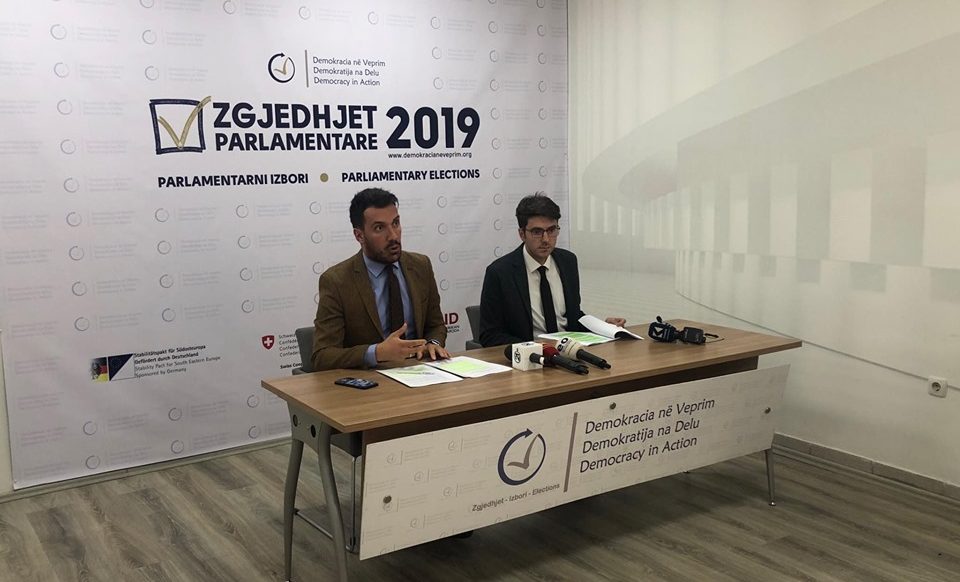


Prishtina, 8 October 2019
The Coalition of NGOs for observation of elections Democracy in Action (DiA), today, through a press conference, has published the preliminary statement on the electoral process for the early parliamentary elections of 6 October 2019.
DiA considers that these elections were conducted in a peaceful and democratic spirit, without any stern irregularities or incidents that could affect the integrity and trust of the public towards the electoral process as a whole. Elections were managed in accordance with the highest standards and pursuant to the legal framework.
Election Day, namely the voting and counting process, was generally conducted in a smooth and peaceful manner, devoid of serious incidents. Publication of preliminary results and the turnout by CEC within a short period of time contributed to increased transparency of the process.
The Central Election Commission and the Municipal Election Commissions have made significant improvements with regard to the transparency of their functioning. Regardless of the short deadlines, CEC has managed to conclude all election activities and operations without delay.
Some of the phenomena that are constantly recurring in Kosovo’s electoral processes, such as the increased number of assisted voters, inaccuracies in voter lists and difficulties in finding the Voting Centre or Polling Station, have been reported in these elections as well. There were also cases of ballot photographing, its publication, as well as the situations of more than one person being behind the voting booth.
In these elections, there were cases of voters being identified with valid but expired documents. CEC, with regard to the identification of voters possessing documents of other countries, issued an instruction which clarified the matter and helped avoid irregularities on the ground.
A concern that still continues to linger was the phenomena of the enormous number of invalid ballots. During these elections, based on current numbers, the number of invalid ballots amounts to over 40 thousand, which corresponds to the trend of previous election cycles. CEC should pay more attention to this issue by investigating the root causes of this enormous number of invalid ballots by auditing them.
In general, the election campaign was dignified and conducted in a peaceful and competitive spirit, with considerable citizen participation and devoid of major incidents. However, in Serb-majority municipalities where coalitions or parties of this community competed, the campaign was not compliant with the standards of a free and equal race. Political parties competing against the Serbian List were intimidated, with citizens pressured to vote for the Serbian List.
Political parties showed no willingness for transparency with regard to their finances and campaign expenditures. DiA, prior to the start of the campaign, requested from political parties to disclose amounts they plan to spend for their campaigns; the manner of financing as well as the campaign leaders and more. Of all the 26 political parties to which this request was addressed, only five responded positively.
According to the monitoring carried out on eight television channels (six Albanian and two Serbian), these media outlets in their election chronicles provided similar space for large political parties, while less space for smaller parties. Some of the TV channels have broadcasted advertising videos of candidates of political partiers during election debates.
Radio Television of Kosovo has shown bias in the coverage of electoral activities of political parties. All PDK rallies have been broadcasted on television as well as live-streamed on RTK’s official Facebook page. The Independent Media Commission, even during these elections, failed to be effective in sanctioning media violations during the election campaign. The presence of women in media, electoral chronicles, and publicity spots of political parties was shorter.
The Election Complaints and Appeals Panel (ECAP), has acted and handled complaints and appeals professionally and impartially, while at the same time respecting the deadlines.
On Election Day, DiA had 2700 observers on the ground, present at all polling stations, around 100 mobile teams, 170 volunteers at the call centre. The pre-election campaign was also monitored by 72 accredited observers.
DiA will also closely follow the counting process at the Results Counting Centre and review any complaints at the Election Complaints and Appeals Panel, until the final certification of results.
You can download the preliminary statement here.